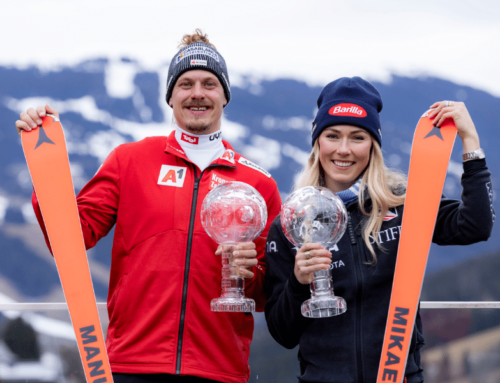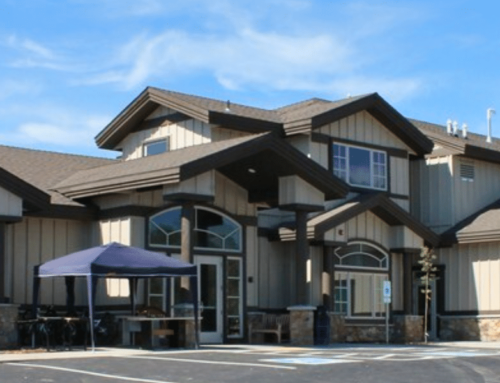Charles Christianson: Finding success on and off the snow
Charles Christianson’s life experience is a story of persistence, adaptation, and improbable achievement. An Alaska native, Christianson grew up skiing at the Alyeska Resort near Anchorage. A four-time All American and retired World Cup athlete, he is currently chief of staff at Alterra Mountain Company and a member of the U.S. Ski & Snowboard Foundation’s Board of Trustees.
As a young ski racer, Christianson was acutely aware of Alaska’s reputation for producing Olympic medalists. Convinced he would follow in the footsteps of greats like Tommy Moe and Hillary Lindh, he spent most of his ski career in pursuit of excellence in the speed events. Christianson believed, if you are the best young speed skier in Alaska, you are the best young speed skier in the world. The illusion went unchallenged until his first Western Region J3 Junior Olympics.
“I got my ass kicked,” Christianson said. However, this realization did not discourage him from continuing to pursue his dreams. Instead, it inspired him to enroll in Utah’s Rowmark Ski Academy, where he raced through high school and two postgraduate seasons.
In his second year of postgraduate skiing, Christianson would experience a significant change of direction. Without a slalom and GS point profile that would be attractive to the Div. 1 powerhouses, he was fortunate that Ed Grees, Williams College’s alpine coach, could see Christianson had both skiing and academic potential and offered him a spot as a member of the Ephs.

Christianson had previously dismissed the idea of skiing collegiately because, like many, he believed it was giving up on his World Cup aspirations. However, new evidence had come to his attention in the form of Jimmy Cochran’s experience at UVM, which revealed to Christianson that skiing collegiately could be a real development path to the World Cup. That combined with a new-found success in giant slalom, and Christianson realized the potential of skiing for Williams College.
“I remember deciding if I should take the third year off between high school and college,” Christianson recalls. “A third year would have required me to reapply to Williams, and a coach told me I would ski faster without the safety net of a college degree because it would light a fire under my ass. I am so glad I did not take that advice.”

As a senior at Williams, the Alaskan speed skier would win half of the Eastern Intercollegiate Ski Association (EISA) races, and achieve podiums in 10 of 12 competitions contested. That year, he collected both the slalom and GS season titles while also setting the Williams all-time win record.
Williams is known as a demanding academic school, so how did Christianson handle a full NCAA and NorAm schedule while meeting the academic demands?
“It required aligning the season goals with my coach, and getting on the same page concerning training,” said Christianson. “We would calendar each event for the season, laying out a road map that made athletic sense and was academically possible. Then, on the very first day of each semester, I would meet with my professors and explain what I was doing. I would ask them to work with me. I always found that by proactively talking to my teachers, I was five hundred percent more likely to get their cooperation. If I wasn’t in class, I submitted my work electronically.”
Asked how he benefited from his collegiate experience, Christianson explained, “My grades were always the highest during the ski season. I learned how to win. I had the opportunity to ski as a team. I experienced mental and physical stimulation, and most importantly, I made actual friends.”
Christianson’s system worked, and after four years, he would graduate with a degree in economics as a four-time All American. In 2008 he became the only skier ever to win the Purple Key Trophy, Williams’ only athletic award.
Graduating from Williams would not be the end of Christianson’s ski racing career or his connection to his Williams community. With the financial support of that community, he spent two seasons skiing as an athlete-mentor at Burke Mountain Academy.
Then, in the spring of 2011, at the suggestion of U.S. Ski Team Head Men’s Coach Sasha Rearick, Dan Leever extended an invitation to join his Team America program as a fully funded athlete. After years of commitment, Christianson could, for the first time, focus all his energy on his skiing.
Training with his teammates, which consisted of elite juniors and collegiate standouts, the program pushed Christianson to new levels. Performing well in the November NorAms, the results were noticed by Rearick, who decided to give him his first World Cup GS start in Beaver Creek.
“I remember hearing the awards ceremony in the background when Sasha called,” said Christianson. “Bode had won, and the place was going crazy. I was dead silent trying to make sure I heard Sasha correctly that I was getting the nod for the GS. He had to ask if I was still there.”
Two days later, with his mother, brother, and college friend in attendance, Christianson finished his first World Cup in 31st position, 0.18 seconds from qualifying for a second run. The run caught Rearick’s attention. The coach would offer him three more World Cup GS starts later that winter. Unfortunately, the dream season concluded with a career-ending knee injury at NASTAR Nationals. Interestingly, he refers to that final event as one of the best times he ever had ski racing.
Asked if he had any regrets, Christianson says, “Hindsight is 20-20, but I probably would have entered (college) earlier to develop physically while in college, maybe even avoided some injuries. Also, the quicker you get in, the quicker you get out.”
“After my third ACL tear in the spring of 2012, I knew I needed to consider life after ski racing. I was scared. I identified as a ski racer and felt that doing anything else would be abandoning an important part of who I was,” he said.
Looking ahead, Christianson struck a deal with mentor Steve Graham (Williams and Burke alum). If he, Christianson, could take a semester of accounting and score higher than 95%, then an internship at Graham Partners, an investment firm, would be waiting for him. From there, Christianson went on to continue his education and graduate from Tuck Business School at Dartmouth.
“With an MBA in hand, I went to work for Danaher before landing at Alterra Mountain Company, where I am today. Entering the professional world outside of sports at an older age meant I needed to progress quickly concerning my business fundamentals,” Christianson said. “Working in an office environment, in general, was a challenge. However, my experiences from ski racing became a real advantage: personal accountability, gameday performance, making decisions; these are valuable traits in the ‘real’ world that you experience every day as a ski racer.”

Concerning the role collegiate skiing plays — or should play — in the World Cup pipeline, the USSS Foundation board member says, “Every national team wants to win medals at World Championships and Olympics. They all look to capitalize on their competitive advantages over other countries to achieve those goals. The fact that the collegiate system sits in the U.S. and can efficiently serve U.S. skiers is a serious competitive advantage for our country. No one else has this opportunity. The USSS should utilize this competitive advantage to help achieve its goal of ‘Best in the World.’ Currently, it’s clear that this isn’t happening, and we need to address the issue.
“I look forward to my role as an athlete representative,” he added. “I want to help discover ways to make collegiate skiing a significant part of the World Cup pipeline. I am encouraged by USSS staff’s statements in their latest Ski Racing op-ed; it sounds like they want to do the same.”
Christianson and wife Courtney recently moved to Colorado to be closer to the mountains. They want to make sure their son has access to the sport they love.
“Having a kid makes you look at what matters,” he said. “We look forward to being ski race parents and continuing in new rolls in the sport.”





















